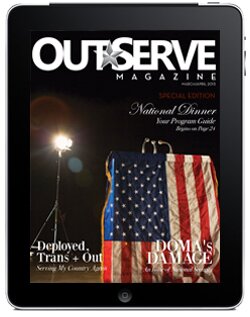Gay Is Good

By Eddy Sweeney, Chief Columnist
 Sept. 20, 2011, may have been the day that “Don’t Ask, Don’t Tell” (DADT) officially ended in the United States, but the moment of truth for me came a few months later, during Christmas. It was our group’s holiday party, and I was bringing my boyfriend to the festivities. Throughout my time serving under DADT, I never really ‘hid’ who I was from my colleagues. I was open to those I was close to, my family knew, and I was not at all ashamed. But as I walked up the snow-trodden path to the hotel dining room, looking through the restaurant’s glass at all my colleagues with their wives and husbands, I began to panic.
Sept. 20, 2011, may have been the day that “Don’t Ask, Don’t Tell” (DADT) officially ended in the United States, but the moment of truth for me came a few months later, during Christmas. It was our group’s holiday party, and I was bringing my boyfriend to the festivities. Throughout my time serving under DADT, I never really ‘hid’ who I was from my colleagues. I was open to those I was close to, my family knew, and I was not at all ashamed. But as I walked up the snow-trodden path to the hotel dining room, looking through the restaurant’s glass at all my colleagues with their wives and husbands, I began to panic.
I squeezed my boyfriend’s hand and felt my fingers slip through his grasp. I was sweating—it was 5 degrees outside. I stopped for a moment to catch my breath. “What’s wrong?” my boyfriend asked. I shook my head and grabbed his hand again. “Let’s go.” As we slowly made our way up the hill, I realized for the first time the visceral impact this law had had on me. Yes, I had vociferously championed its demise in the very pages of this magazine. Yes, I had come out publicly the day of repeal. But at this all-important moment when my colleagues were about to meet my “significant other,” I quite literally choked.
As we entered the door and hung our coats, I shamefully asked my boyfriend to wait in the foyer, alone, while I ran to the bathroom. I busted through the door and ran to the sink, I felt my insides squirm and realized my throat was completely dry. I drank some water and splashed it over my face. OK, I thought, I can do this.I emerged from the bathroom and found my boyfriend patiently waiting by the coat rack looking at his phone. “You ready now?” he joked. I had been ready for four years, I wanted to say, but my actions had proven otherwise. I smiled and led him to the restaurant.
When we look back at the past year of open service, it is important to celebrate the firsts that this first year has been all about. Like the first marriage on a military base between two men, Air Force Tech. Sgt. Erwynn Umali and Will Behrens. Or the first openly gay flag officer in the U.S. military, Army Reserve Brig. Gen. Tammy Smith. Or the first pride parade in San Diego, where LGB service members could march openly and proudly. These seemingly small milestones each contribute to crafting a wider picture of equality in the American collective. Beyond those who are part of these firsts are the millions of young sons and daughters who will grow up asking the simple question to those who wish to discriminate: “So they’re gay, your point?” Niccolò Machiavelli said it best when he wrote in The Prince: “It ought to be remembered that there is nothing more difficult to take in hand, more perilous to conduct, or more uncertain in its success, than to take the lead in the introduction of a new order of things.”
In Tony Kushner’s Tony Award-wining play, Angels in America, one of the main characters, Prior Walter, utters what I think sums up quite well the gay movement in America over the past year: “The world only spins forward. We will be citizens. The time has come.” Change, change, change. It can never come fast enough for those who need it most, but I tend to take the long view of such things when considering how rights are established in America.
When Mr. Kushner’s play debuted, it was 1993 and in the United States gays and lesbians still did not have the right to have sex in their own private bedrooms, let alone openly serve or marry someone of their choosing on a state level. One’s partner of 20 years could be dying in the hospital room and visitation rights would be denied because he or she was not part of “the family.” Actors and actresses feared revealing their sexuality would kill their chances at landing leading roles. On the congressional level, just a handful of politicians were out.
If we compare the length of time it took for African Americans in this country to gain equal rights—a process arguably still under way—it is breathtaking in its scope. From the end of the Civil War and the ratification of the 13th amendment in 1865 to almost a century later with the Civil Rights Act of 1964, notions of equality were still disproportionally applied across all races, ethnic groups, and religious minorities, and to women, too. Even after that law’s landmark passage it took decades for African Americans and women to be treated equally. As recently as 2009, President Barack Obama signed the “Lilly Ledbetter Fair Pay Act,” a law that stated the seemingly obvious: that it should be illegal for employers to pay unequal wages to men and women who perform substantially equal work. We have come a long way in the United States toward equality, but we still have a ways to go.
I asked my fellow service members how they felt a year after repeal, and what, if anything, surprised them most about LGB inclusion in the military. Senior Airman Brad Gilligan wrote: “In all honesty, I feel both the same and really great. For me personally, not much has changed…but, of course, there are little things that I notice. Such as, there’s not as much whispering going on around the water cooler when talking about gay topics. There’s still a lot that can be done, but I can definitely sense an overall better climate in the Air Force than when DADT was still the law.”
Maj. Mike Almy, who the Air Force famously discharged under DADT when one of his coworkers broke into his personal email and outed him, wrote: “I’m very pleased that repeal has gone so well. This highlights how professional our military is and how much of a non-issue this really was. It’s so encouraging to know that many of the people serving openly now in our armed forces are doing so right alongside their straight counterparts. Our military and our country are stronger through diversity. Unfortunately, repeal came too late to save my career, but, thankfully, no American service member will ever have to live with the heavy burden of DADT any more.” And what a burden it has been—for thousands, some whose voices now lay beyond the grave and whose stories now exist in books and memories.
In Linda Hirshman’s new book, Victory: The Triumphant Gay Revolution, she writes beautifully on the achievements LGBT citizens have garnered in America: “As the most marginalized group of Americans fought for full inclusion in the social order, they didn’t only change their world; they changed everyone’s world. Because they were different…they had to change the meaning of the core concepts of citizenship—morality, sanity, loyalty—itself.”
It was perhaps this sense of being different with something that I could have kept internal that I think riled my nerves when I took my boyfriend to our holiday party. Perhaps the best memory I have from that December night is that of laughter. When I began to introduce my boyfriend to my colleagues, there were no glares or outward looks of disgust. Instead, and not surprisingly, there was warmth and joy. Even people whom I had not expected to be as welcoming had the courtesy to seek me out and introduce themselves to my boyfriend.
Yes, in some ways, I was on display as the first openly gay person in my unit to come out. Much more important, my colleagues’ actions that night led me to feel something bigger and more important: inclusion.
So let’s celebrate, my fellow LGB service members, that we can finally be part of the American story. Well, we always have been. But this time, let’s rejoice in the fact that we can do it openly. As the indefatigable Franklin Kameny once said, “Gay is good.”






